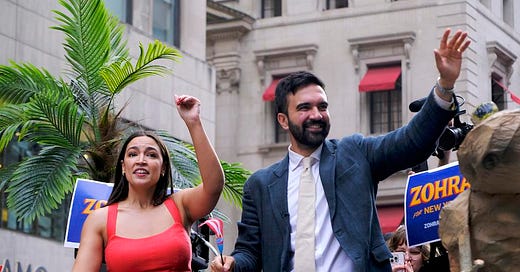“We don't want crumbs. We want the kitchen. And the garden. And the recipe.”
— campaign slogan spotted in Queens
What if the next mayor of New York City wasn’t backed by Wall Street, the real estate lobby, or the NYPD—but by tenants, transit riders, and the people who feed them?
With the June 24 primary fast approaching, the Democratic race for New York’s top job has crystallized into a contest between Andrew Cuomo, the disgraced former governor trying to stage a comeback—and Zohran Mamdani, a 33-year-old democratic socialist and Assemblymember from Queens who’s running on a platform of rent freezes, free transit, food sovereignty, and joyful resistance.
But this isn’t just a David vs. Goliath story. It’s the clearest test we’ve had in years of what legitimacy looks like without institutional endorsement, and how authority can be built through culture instead of capital.
Roti as Resistance
Mamdani’s campaign doesn’t just talk about justice—it serves it, sometimes on a paper plate.
He calls it “Roti and Roses,” a remix of the classic labor slogan “Bread and Roses.” It’s not just a nod to immigrant food culture. It’s a political program. A theory of power.
In Mamdani’s hands, roti becomes metaphor, manifesto, and organizing principle:
It affirms care as infrastructure, the right to food as foundational—not supplemental—to democracy.
It positions culture as both the medium and message of resistance. Not tokenized identity politics, but cultural legitimacy rooted in dignity.
It offers a different image of power: one where sustenance, joy, and solidarity are governance.
Compare this to the traditional machinery of electoral politics, which serves consultants, donors, and narratives of inevitability. Mamdani’s roti stands in direct opposition to that whole system. It's not a handout. It's a meal you make together.
Mamdani’s rise isn’t an accident. It’s the crest of a wave that’s been building beneath the surface of New York politics for years.
This is a coalition forged not through party loyalty, but shared precarity: renters, gig workers, youth, immigrant communities, artists, disabled organizers, people of faith, and climate activists.
Many of them came of age under broken institutions. They don’t believe the Democrats will save them. But they believe in each other. And Mamdani speaks their language—literally and politically.
He doesn’t frame his campaign as a rejection of authority, but as a reclamation of the right to govern ourselves. This is a politics of assembly, not access. You don’t need a seat at the table—you just need a folding chair, a sound system, and something warm to eat.
Ranked Choice, Ranked Culture
New York’s ranked-choice voting system adds another layer to this drama. The progressive coalition has adopted a bold tactic: Don’t Rank Evil Andrew—a campaign urging voters to leave Cuomo off the ballot entirely, even in later rankings.
It’s more than a slogan. It’s a refusal to compromise with empire. It’s a way of saying:
“You don’t deserve another chance just because you still have money and name recognition.”
This tactic—strategic omission—is a cultural move as much as a political one. It signals a collective moral clarity, the kind that movements are made of.
And it mirrors what Mamdani is offering: a system where your values don’t dilute over time, but sharpen. Where voting isn’t a transaction, but a declaration.
Perhaps the most radical thing about Mamdani’s candidacy is its refusal to be cynical.
He’s running not on fear, but on hope as method. And not the empty hope of Obama-era branding—but a grounded, collective, sensual kind of hope:
The smell of fresh food at a campaign stop.
The rhythm of a multilingual chant echoing through Astoria.
The thrill of seeing someone who looks like you on the ballot—and actually having a shot.
This is what post-institutional authority looks like. Not policy papers, but people. Not control, but care. Not consensus, but coordination.
And if Mamdani wins—or even comes close—it will mark the rise of a new theory of governance, one rooted in culture, nourishment, refusal, and joy.
Whatever happens on June 24, Mamdani’s candidacy is already shaping the future of authority. It's modeling how movements can take power without becoming the thing they despise. It’s proving that politics without the party machine is not only possible—but delicious.
So let’s stop asking whether the left can govern. We’ve been governing each other for years—through mutual aid, tenant unions, co-ops, and care.
What Mamdani is showing us is how to scale that power—not upward, but outward.
 Tiktok failed to load.
Tiktok failed to load.Enable 3rd party cookies or use another browser






This is so inspirational!!!!! hell yes!
There is so much in there -- thanks.
A quick thought on ballot ranking, from an article where I quote:
"A lot of voters - especially a lot of idealistic left-wing voters - are a bit silly about this and worry that if they preference a party they dislike they may help it win. Well yes, but your preference can only ever reach that party if the only other parties left in the contest are the ones you have preferenced behind it or not at all! If that's the case then someone from that list is going to win a seat, whether you decide to help the lesser evils beat the greater evils or not. "
https://r.flora.ca/p/conservative-democrats-fail
I believe Maxime Bernier lost to Andrew Scheer in 2017, a clear lesser of evils, in that US-style presidential leadership race because those who purchased a ballot (how the corrupt Canadian parties work) kept ranking past those who they thought were worthy.
This sidelined Bernier, and pushed him out of mainstream politics, which I believe is a critically important outcome.
This is one of many places that self-identified right-wing always win over self-identified left-wing, which is that the right-wing are far more willing to be long-term strategic.